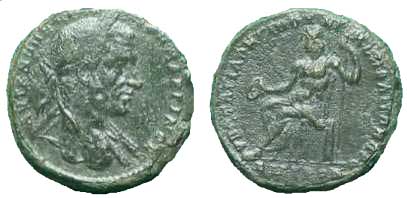| 217
AD - 218 AD |
Nicopolis ad Istrum Moesia Inferior Macrinus
Νικόπολις προς Ιστρον Κάτω Μοισία Μακρίνος
| AE 27 |
SHH 34 |
 |
| Parameter Obverse Reverse Notes Reference Provenance Donated |
13.84 g 25.9-27.2 mm 2.9 eqmm
7:00
o'clock VF centering + / + σmax(SigmaTest, 240 Hz) = obv. 10.8, rev. 11.0 MS/m Laureate and cuirassed bust of Macrinus right; AVT K M OΠEΛ / [CEV] MAKPEINOC. Jupiter seated left holding patera and scepter; VΠ CTA ΛONΓINOV NI / KOPOΛITΩN ΠRO around, in exergue C ICTRON. ? AMNG I/1 1720/3; BMC 46; Copenhagen ---; Lindgren I 720; Moushmov 1249; Sear Greek Imperial ---; Varb anov 3487 22.9.2003 Griechisches Münzwerk, Berlin-Brandenburgische Akademie der Wissenschaften, 11.2018 |
Macrinus (217 - 218 AD)
Marcus
Opellius Macrinus later took the name Marcus Opellius Severus Macrinus,
born circa 164 - 165 AD. Macrinus was born into an Equestrian order
family in Caesara, Mauretania. He went to Rome to seek a living as an
advocate, and found employment in the household of Severus, eventually
rising to become the Praetorian Prefect under Caracalla. During the
eastern campaign of 217 AD, Caracalla heard a prophecy that Macrinus
was destined to become Emperor. Knowing the suspicious nature of
Caracalla, and thus fearing for his own safety, Macrinus commissioned
the murder of the emperor, on April 8th, 217 AD. Several days later
(April 11th), the eastern legions hailed Macrinus as emperor, and his
son Diadumenian as Caesar, and the elevation was soon ratified by the
Senate and accepted by the western legions. The reign of Macrinus was
pleasant enough for Rome and Italy, as he took steps to alleviate the
burden of taxation and duties. However, Macrinus soon alienated the
army, by suffering a minor defeat and concluding a humiliating peace
treaty at the hands of the Parthians, and by reducing the legionary pay
rates. A mutiny, inspired by the sister of Julia Domna, broke out in
Syria in the spring of 218 AD. In an effort to regain the loyalty of
the troops, Macrinus elevated his son to the rank of Augustus and
declared a large donative. These measures were too late, however, and
Macrinus and Diadumenian were captured and executed in June.
Apparently, Macrinus spent his entire reign in the east, never
returning to Rome.